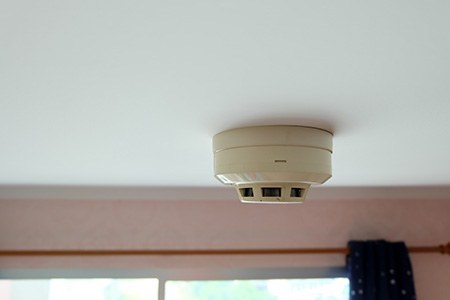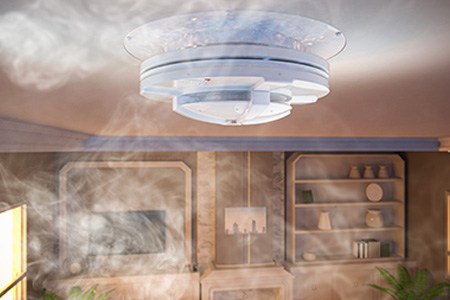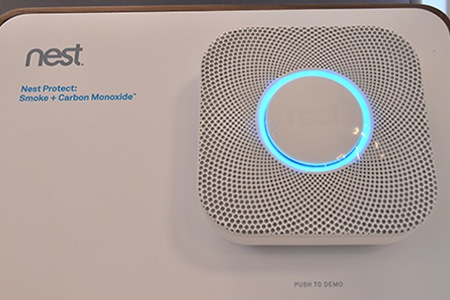Fire Alarm Randomly Going Off for a Few Seconds
Author: Omar Alonso | Editor: Omar Alonso
Review & Research: Jen Worst & Chris Miller

Have you recently had a fire alarm randomly going off for a few seconds? This can be irritating, especially during a good night's sleep. Regardless of how inconvenient and disruptive this can be, it is an essential safety device that must work properly at all times.
So how can you keep this device from going off for no reason? Don't worry as we've got all of your answers right here! This article will talk about fire alarms in detail, including types, causes, and helpful tips for when they start beeping on their own.
First: Turning Off the Alarm
In case your alarm goes off or is already beeping like crazy, you might want to turn it off immediately, especially if you have any types of sprinkler heads above that you risk going off and soaking everything.
To do so, hold down the hush button for around 10 seconds and release it. You can find this button on the front part of the alarm. It may also be labeled "test/silence" or "test/hush" because it functions differently depending on how long you press the button.
There’s no need to remove the battery; instead, move the device to a separate area of your home and clean the unit there. If the beeping persists, then that's when you replace the battery.
Smoke Alarm vs. Smoke Detectors

Before we get into what causes a random alarm to go off, let's first define it. A fire or smoke detector is a detection system that automatically alerts people when smoke is detected. Take note of the distinction between a smoke "alarm" and a "detector."
A detector is simply a sensor that monitors smoke and is linked to a building's fire alarm system. An alarm, on the other hand, includes a smoke sensor as well as a built-in speaker to alert building occupants and people nearby.
Smoke alarms are classified into two types: ionization and photoelectric detectors.
Ionization Detectors
Ionization detectors detect smoke and other combustible particles in the air, which is used as an early warning system for fires. These detectors contain a trace of Americium-241, a radioactive material that converts air molecules into ionized particles, which generate an electrical current. The resulting electrical current is measured, and if a certain threshold is exceeded, an alarm will sound.
This particular smoke alarm responds better to flaming fires and is often likely used in combination with other types of detectors to provide maximum protection against fire.
Photoelectric Detectors
On the other hand, photoelectric detectors don’t have radioactive materials but use the presence of light for detection. When smoke enters the device, it scatters light and is picked up by photosensitive cells. This light is converted into an electrical signal, which can then be used to trigger an alarm. If the amount of light captured exceeds the device’s threshold, an alarm will sound instantly.
These detectors are more sensitive to smoldering fires and are used in security systems, automotive applications, and industrial automation. When you have these throughout your home and they all go off together, it's very hard to determine which is the problem.
My recommendation is to first go through the house and ensure there's no fire and everyone is safe. Then check the one in the garage as it probably has a pile of bugs in it disrupting the light sensor. That's a huge cause for a smoke detector going off for no reason that you can quickly identify.
Which Alarm To Use?
Now that you know both types of smoke alarms, which one should you use? The National Fire Protection Association (NFPA) recommends installing both types of alarms as they each have their advantages. This would give you a stronger detection system that can effectively help save lives.
False Alarm Smoke Alarm Causes & Solutions
Now that we've covered what a fire alarm does, let’s get down to business. Here, we've compiled the most likely causes of your smoke alarm randomly going off on its own, along with instructions on how to fix them.
1. Dust

Dust is probably the most common cause of a smoke alarm behind a fire alarm randomly going off for a few seconds. Like smoke, dust can reflect light particles, which can cause a false positive and set off your alarm.
Solution: Clean Your Smoke Alarm
Simply remove the outer case to clean the dust-filled interior. Smaller dust particles are removed with a vacuum attachment or an electronic aerosol cleaner. Also, keep in mind to always pay close attention to the sensors to avoid damage while cleaning.
2. Dead or Low Battery
Fire alarms may go off due to low battery life. Alarms are designed to go off if there is a sudden drop in the electrical current. By doing so, smoke is inhibited from further increasing the current. So, in the event, your battery weakens or dies, the current flowing through your sensor decreases. This results in a false positive response, which sets off an alarm.
Solution: Replace Batteries as Needed
Replace the batteries in the fire alarm every six months after installation. Things can get tricky if you forgot when your device was installed because the only time you'll think to check if the batteries need replacing is when you deal with your fire alarm going off randomly, often in the middle of the night.
You should also check if the batteries are still functional. Press the button on the front of the panel once, then release it. If the alarm is clear, distinctive, and loud, then your device is working properly. However, if there is no sound or if the sound is distorted, the batteries must be replaced right away.
3. High Humidity

If you live in a humid climate or if an alarm is placed near the bathroom, heavy water particles may be setting it off. Moisture can obstruct current flow in the same way that smoke does. As a result, a detector may be unable to differentiate between smoke and moisture in the air. Steam can set off a fire alarm!
Solution: Place It in a Less Humid Area
Be sure not to place any fire alarms near the bathroom or humidifiers. Also, ensure that your home has constant air circulation by using a fan or opening a window whenever possible.
4. Placing Near the Kitchen
Most people would put a smoke alarm near or inside the kitchen because it is the most likely place for a fire to start. However, smoke from cooking, particularly burnt food, can set off an alarm.
Solution: Try Using a Heat Detector
Using a heat detector is more appropriate and advisable. In contrast to a smoke detector, it only sounds an alarm when the temperature exceeds the threshold level and is not dependent on smoke detection. Integrating heat detectors into a system and including smoke alarms in additional locations is recommended for maximum protection.
5. Fresh Paint
Let's say you just painted your basement ceiling and painted around your smoke detectors. Fresh paint can also be a culprit in triggering your alarm because of the off-gassing effect it gives off. This off-gassing (also called fumes) can easily be the cause of your fire alarm randomly going off for a few seconds as it can resemble smoke.
Solution: Increase Airflow
Increase the airflow of the area by opening any doors or windows or by placing and directing fans to those sections. This will help the paint dry out a lot quicker.
6. Bugs

It is a well-known fact that bugs prefer to live in dark and small spaces, which is why they might find your fire alarm to be the most suitable place to settle in. They get into your garage mostly and are attracted by the light on your smoke detector and climb in it, tripping the sensor. Gnats, flies, mosquitos, and termites are attracted to light, as maybe 1% of the total list. It's a problem that's happened to me before.
Solution: Clean Your Device
Check to see if there are any critters around or if there is a burning odor. If it does, open it and use hand gloves or a soft brush when removing traces of bug carcasses. After re-installing, be sure to use bug spray around it to prevent this issue from recurring. Avoid spraying directly as this can cause your gadget to malfunction.
7. Defective Fire Alarm
Even though these products go through a lot of tests before being sold, there is always a possibility that you may have bought a faulty product. If you detect that the item you just bought might be defective but still under warranty, it is best to replace it as soon as possible.
This is the hardest reason to confirm confidently as the reason for your your fire alarm randomly going off for a few seconds, but it's the easiest to get past. If you trade it in for a different one and you keep having the problem, then you know you have some other issue at hand.
Solution: Return and Purchase a New Fire Alarm
Also, make sure that you buy your products from legitimate sellers.
8. Inaccurate Installation
It's no surprise that most homeowners would install their newly bought fire alarms themselves. But due to them not fully understanding the procedure, this may cause a few installation errors which can lead to numerous false alarms.
It’s best to call someone you know who has experience installing it. You can also call up a service that offers assistance.
Consider Buying Smart Detectors

Tired of all the issues we’ve mentioned? Then why not upgrade to a more advanced smoke detector that reduces false positives and makes it much more convenient for you to turn off those pesky alarms?
With Smart Detectors, you can use your phone to easily control it. You can even connect it with any other systems in your home such as your security system for an added layer of protection.
That’s Why Your Fire Alarm Keeps Going Off
It can be annoying waking up to the sound of your alarms going off for no apparent reason. But even if your fire alarm keeps going off, it is still crucial to have it around as it has the potential to save lives. It's understandable that false alarms are considered acceptable because that's more safe than it not going off when actually needed.
So, if you ever have a fire alarm randomly going off for a few seconds at a time, check out our list above and see which solution best suits your needs.



